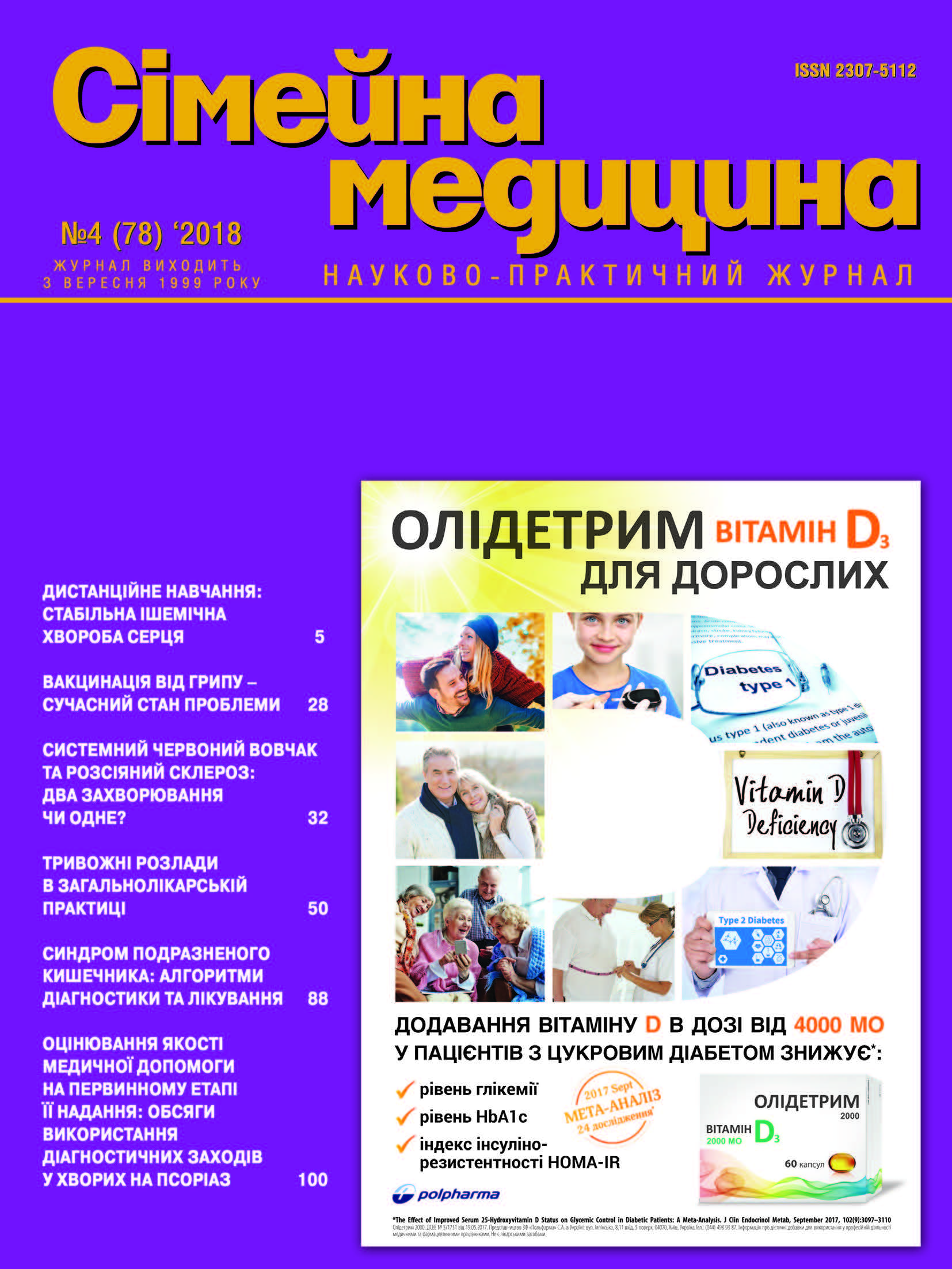Features of Diagnostics and Prophylaxis of Fetal Distress in Women with Autonomicdisorders
##plugins.themes.bootstrap3.article.main##
Abstract
The objective: to establish relationships between prenatal stress changes, autonomic disorders and the fetal distress development in pregnant women with perinatal losses in history.
Materials and methods. 214 pregnant women were examined. In the 104 pregnant women with perinatal a history of losses, the control group (group II) – 110 women without obstetric history. Study groups were identical in age, duration of pregnancy and parity of childbirth. To study the state of vegetative regulation was usedanalysis of cardiointervalography indicators. Assessment of adaptation reactions was carried out in terms of regulatory activity systems. To study the hemodynamic component of the system «mother–placenta–fetus» was performed by Doppler ultrasound.
Results. In the majority of women in control group (82.7%), the normal reactivity of both departments of the autonomic nervous system was noted. Autonomic reactivity in the main group was manifested as sympathotonia in 48.1% of women and hypersympathotonia in 34.6% of patients. The norm-adaptive state was detected in 90% of pregnant women of II group. In 50% of patients with complicated obstetric history a hypoadaptive state of regulatory systems was established. Symptoms of placental dysfunction occurred in 46.2% of pregnant women in group I and in 29.1% of control group patients. Ultrasound signs of fetal distress were found in 10.6% in I group and 2.7% in II group. At the same time, in 7.7% of the main group, fetal distress occurred in preterm pregnancy. In the control group preterm caesarian section due to fetal distress was perform in 0.9% of women.
Conclusions. In women with perinatal losses, an autonomic dysfunction, which is manifested by hypersympathotonia, and disorders of regulatory and adaptive mechanisms are installed, which lead to a functional reserves exhaustion. In pregnant women with perinatal losses a greater frequency of placental dysfunction with the hemodynamic disorders in the system of «mother–placenta–fetus» and fetal distress are observed due to established autonomic disorders.##plugins.themes.bootstrap3.article.details##

This work is licensed under a Creative Commons Attribution 4.0 International License.
Authors retain the copyright and grant the journal the first publication of original scientific articles under the Creative Commons Attribution 4.0 International License, which allows others to distribute work with acknowledgment of authorship and first publication in this journal.
References
Alder J, Fink N, Bitzer J, et al. Depression and anxiety during pregnancy: a risk factor for obstetric, fetal and neonatal outcome? A critical review of the literature. J Matern Fetal Neonatal Med. 2007; 20: 189–209. https://doi.org/10.1080/14767050701209560
Dunkel-Schetter C. Psychological science on pregnancy: stress processes, biopsychosocial models, and emerging research issues. Annu Rev Psychol. 2011; 62: 531–558. https://doi.org/10.1146/annurev.psych.031809.130727
Littleton H, Breitkopf C, Berenson A. Correlates of anxiety symptoms during pregnancy and association with perinatal outcomes: a meta-analysis. Am J Obstet Gynecol. 2007; 196: 424–432. https://doi.org/10.1016/j.ajog.2007.03.042
Talge N, Neal C, Glover V, et al. Antenatal maternal stress and long-term effects on child neurodevelopment: how and why? J Child Psychol Psychiatry. 2007; 48: 245–261. https://doi.org/10.1111/j.1469-7610.2006.01714.x
Vanden Bergh B, Mulder EJH, Mennes M, et al. Antenatal maternal anxiety and stress and the neurobehavioral development of the fetus and child: links and possible mechanisms. A review Neurosci Biobehav Rev. 2005; 29: 237–258. https://doi.org/10.1016/j.neubiorev.2004.10.007
Bornstein M, Hahn C, Haynes O. Maternal personality, parenting cognitions, and parenting practices. Dev Psychol. 2011; 47: 658–675. https://dx.doi.org/10.1037%2Fa0023181
Боташева Т.Л. и др. Влияние метаболического гомеостаза на вегетативный статус женщин в зависимости от стереоизомерии функциональной системы «мать–плацента–плод» / Современные проблемы науки и образования. – 2016. – № 5. Full text
Михайлова К.П. Влияние состояния вегетативной нервной системы на течение беременности, родов и состояние новорожденного / Автореферат дисс … канд. мед. наук. – М., 2015.
Венцківська І.Б., Майданник О.Ф. Вплив психоемоційного навантаження на перебіг вагітності / Зб. наук праць Асоціації акушерів-гінекологів України. – К.: Інтермед, 2010. – С. 20–24.
Чехонацкая М.Л. и др. Особенности психоэмоционального статуса у беременных с фетоплацентарной недостаточностью / Саратовский научно-медицинский журнал 8.2 (2012). PDF





